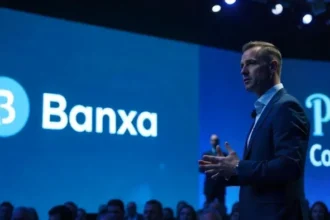In a strategic move to expand access to physically-backed gold investments, Amundi Physical Metals plc (GLDA) has announced the issuance of 127,600 additional ETC Securities, marking the rollout of Tranche 678 under its Amundi Physical Gold ETC program. These new securities will be available for trading starting April 9, 2025, across major European stock exchanges.
With this addition, the total number of ETC Securities in circulation rises to 56,358,859, underscoring growing investor appetite for low-cost, gold-backed investment instruments in today’s volatile market.
Let’s explore what this new tranche means for gold investors and how the Amundi Physical Gold ETC operates.
What Is the Amundi Physical Gold ETC?
The Amundi Physical Gold ETC (GLDA) offers direct exposure to the price of gold, without requiring investors to own or store physical bullion. Each ETC Security represents a defined Metal Entitlement — as of the Subscription Trade Date, this is 0.03967808 fine troy ounces of gold per security.
These securities are:
- 100% physically backed by allocated gold
- Held in secure storage with HSBC Bank plc (Custodian)
- Traded across leading exchanges including Euronext Paris, London Stock Exchange, Deutsche Börse, Borsa Italiana, and Euronext Amsterdam
With a Total Expense Ratio (TER) of 0.12%, Amundi’s ETC stands out as one of the most cost-efficient gold ETCs in the European market.
Why Tranche 678 Matters: Growing Appetite for Gold
The issuance of Tranche 678 is not just an administrative update — it’s a clear signal of rising demand for gold-linked financial instruments. Several macroeconomic and geopolitical factors are driving this demand:
1. Inflation Hedge
As inflation persists across Europe and globally, investors are turning to gold as a traditional safe haven to protect purchasing power.
2. Geopolitical Tensions
Ongoing geopolitical risks (e.g., Middle East tensions, Ukraine conflict, China-Taiwan scenario) are pushing investors toward defensive asset allocations, including precious metals.
3. Market Volatility & Central Bank Moves
With central banks, including the ECB and the Federal Reserve, sending mixed signals on rate policy in 2025, gold serves as a hedge against currency debasement and monetary instability.
4. Institutional Interest
Tranche 678 reflects continued institutional interest, particularly from pension funds, family offices, and asset managers looking for exposure to gold via regulated and cost-efficient vehicles.
Key Features of the Amundi Physical Gold ETC
| Feature | Details |
|---|---|
| Security Type | Physically-backed Exchange Traded Commodity (ETC) |
| New Tranche Issued | 127,600 ETC Securities (Tranche 678) |
| Total Securities | 56,358,859 |
| Metal Entitlement | 0.03967808 troy oz per security |
| Custodian | HSBC Bank plc (Allocated Gold Accounts) |
| Expense Ratio (TER) | 0.12% annually |
| Exchange Listings | Euronext, LSE, Deutsche Börse, Borsa Italiana |
| Availability Date | April 9, 2025 |
Global Trading Access
The Amundi Physical Gold ETC is designed for global accessibility. Alongside European listings, applications are also made for the International Quotation System (SIC) of the Mexican Stock Exchange, further increasing visibility and tradability for global investors.
This cross-market availability aligns with Amundi’s mission to provide transparent, liquid, and low-cost access to gold — a crucial hedge in diversified portfolios.
Why Choose a Gold ETC Over a Gold ETF?
While both ETFs and ETCs provide exposure to gold, there are key differences that make ETCs, especially physically-backed ones like Amundi’s, appealing to investors:
| Gold ETF | Amundi Physical Gold ETC |
|---|---|
| Structured as a fund | Structured as a debt security backed by gold |
| May hold derivatives | Fully backed by allocated physical gold |
| Regulated under UCITS | Not UCITS, but fully collateralized |
| Slightly higher TERs | Low TER of 0.12% |
| Focused on broad retail base | Attracts institutional and sophisticated investors |
Strategic Considerations for Investors
Amundi’s move to issue a new tranche reflects increased institutional allocations to gold. For long-term investors, it offers:
- Inflation protection
- Portfolio diversification
- A hedge against market volatility
- Exposure to a historically stable asset class
With gold prices nearing all-time highs in 2025, these ETCs provide a timely entry point without the complexities of physical bullion ownership.
❓ Frequently Asked Questions (FAQs)
Q1: What is the Amundi Physical Gold ETC?
A: It’s a physically-backed security that tracks the price of gold. Each ETC Security is supported by allocated physical gold stored securely with HSBC.
Q2: What does Tranche 678 mean?
A: Tranche 678 refers to the most recent issuance of 127,600 new ETC Securities under Amundi’s gold ETC program, available from April 9, 2025.
Q3: How does this differ from a gold ETF?
A: While both offer gold exposure, Amundi’s ETC is backed by allocated gold and operates as a debt security rather than a fund. It also carries a lower expense ratio.
Q4: Where can I trade the Amundi Gold ETC?
A: It is listed on Euronext Paris, Amsterdam, London Stock Exchange, Deutsche Börse, Borsa Italiana, and other major exchanges.
Q5: Is my investment physically backed?
A: Yes. Each ETC Security corresponds to a fixed weight in fine troy ounces of gold, which is securely held in physical form.
Final Thoughts: Gold Exposure with Efficiency and Security
The addition of Tranche 678 to the Amundi Physical Gold ETC underscores a fundamental shift in investor behavior. In a world marked by volatility, inflation, and geopolitical risk, gold remains a core pillar of resilient investment portfolios.
Amundi’s strategy of issuing new tranches allows the ETC to scale with demand while maintaining transparency, low cost, and physical backing. For investors seeking smart, secure exposure to gold in 2025, this ETC continues to deliver compelling value.
⚠️ Disclaimer:
The content provided in this article is intended for educational and informational purposes only. It does not constitute investment advice, financial recommendations, or an offer to buy or sell securities. Investment in precious metals and ETCs involves risk, including potential capital loss. Always consult a licensed financial advisor and perform your own due diligence before making any investment decisions.



